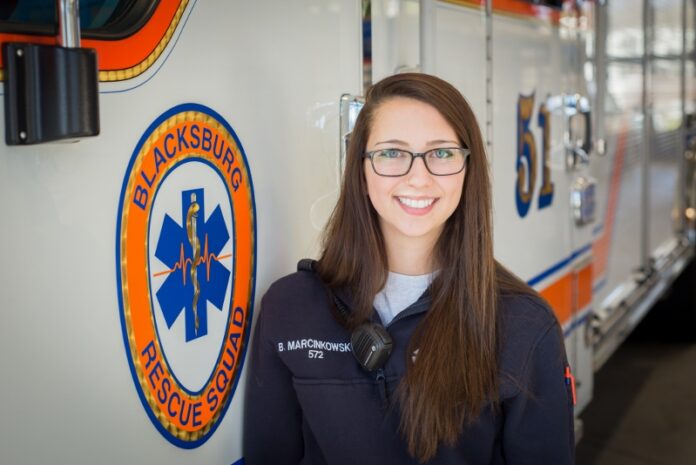
When Bridget Marcinkowski was a little girl, she lost her mother to breast cancer. Ever since, Marcinkowski knew she wanted to dedicate her life to medicine, specifically, to cancer research.
When attending orientation preceding her freshman year at Virginia Tech, Marcinkowski said she was immediately drawn to Virginia Tech’s new nanoscience program, part of the College of Science’s Academy of Integrated Science. She reasoned that the program would provide supplemental knowledge when paired with her intended major in the Department of Biological Sciences. So, she majored in both.
Marcinkowski said she was initially a bit daunted by her student peers within the nanoscience program, but she also recognized the field’s potential to revolutionize medical research, and she was excited to join a program that would provide her with opportunities to expand her horizons and gain hands-on experience.
In her experiences with research and lab work, Marcinkowski quickly learned to appreciate the applications of nanoscience in the field of health care, particularly when combined with biological sciences.
“Nano has transformed me as a student and a person as a whole. I now am the type of person who reads scientific journal articles every day for fun,” said Marcinkowski, of Burke, Virginia. “I have gained a lot of confidence in my abilities. I have learned how to approach and overcome challenges that may appear insurmountable, such as quantum physics. And I have learned how invaluable collaboration and critical thinking are. Overall, I feel well prepared to face whatever the real world has in store for me.”
She has also come to view problem-solving with more of a “big picture” approach, taking the time to consider problems from a new perspective. “The courses I took strengthened my understanding of upper-level math and physics and provided me a unique perspective from my biology peers,” she said. “I learned to address big problems with solutions on an infinitesimal scale. This program also helps students hone essential professional skills, such as how to effectively disseminate scientific research.”
Marcinkowski added, “Biology encompasses many sub-disciplines and allows students the opportunity to explore a wide range of interests. I thoroughly enjoyed the unique electives I was able to take, as well as courses that have prepared me well for a career in medicine. I have been fortunate to take classes solely because they pertain to my interests, such as research ethics, cancer biology, and histology.”
Marcinkowski has spent her past two summers as an intern conducting research in the breast cancer immunology lab at Johns Hopkins University. This experience allowed her to discover specific areas of research she wants to pursue. In addition to her internship, she has also consistently participated in undergraduate research and does lab work for the Virginia Tech Carilion Research Institute in Roanoke.
While double majoring, Marcinkowski also serves as a member of the Blacksburg Volunteer Rescue Squad. Through this work she is able to combine her commitment to the spirit of Ut Prosim (That I May Serve), Virginia Tech’s motto, and her passion for medicine. “I strove to give something back to a community that has provided so much to me throughout the past four years,” Marcinkowski said. “I feel that I am living out Ut Prosimevery time I am able to provide compassion and care to a patient.”
Following graduation, Marcinkowski plans to begin a research fellowship with the National Institutes of Health, where she will spend two years researching T-cell-based immunotherapies for cancer treatment in order to determine why some patients respond completely and others do not. She also plans to search for ways to continue to carry on the spirit of Ut Prosim in her new community of Bethesda, Maryland.
“I also hope to pursue other forms of service that specifically address health disparities,” she added. “This is an area of service that has become increasingly important to me, and I hope to focus my efforts on reaching individuals from populations that are generally underserved, disadvantaged, or indigent.”
Written by Jessie Rogers, a junior in the Department of English

